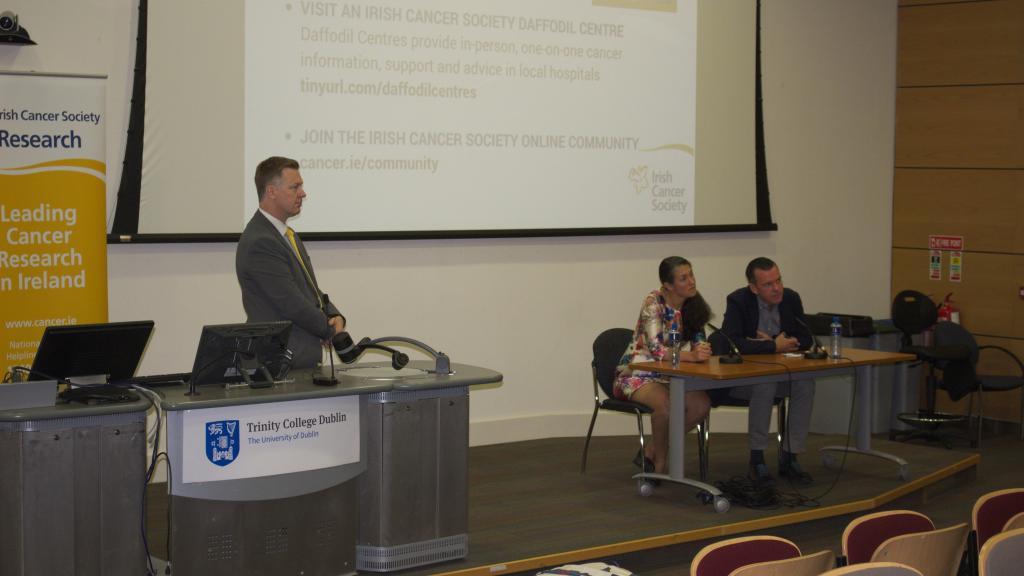
Cancer and Mental Health
The Irish Cancer Society recently hosted two experts in mental health and cancer for a public talk on the effects a cancer diagnosis can have on people with significant mental health difficulties.
The talk ‘Decoding Cancer: Bridging the Gap between Cancer and Mental Health,’ included contributions from Dr Kelly Irwin, an instructor in psychiatry at Harvard Medical School, and Dr Paul D’Alton, Head of the Department of Psychology at St Vincent’s University Hospital (pictured, with Irish Cancer Society Head of Research Dr Robert O’Connor on the left).
At the talk the audience heard how people with significant mental health difficulties are dying earlier and more frequently from cancer because they are less likely to receive the care they need and are excluded from clinical trials.
Dr Irwin outlined the inequities people with these difficulties face when they are diagnosed with cancer and highlight potential solutions. Dr D’Alton also explained how these inequities can be addressed in Ireland by establishing core Psycho-Oncology services, as set out in the National Cancer Strategy (2017-2026).
Among the inequities people with significant mental health difficulties face as cancer patients:
- Individuals with such difficulties as schizophrenia, bipolar disorder and severe depression are dying nearly 30 years earlier than the general population. Four out of five of these deaths are due to medical causes, and cancer is the second leading cause of death.[i]
- People with significant mental health difficulties, and schizophrenia in particular, are two to four times more likely to die from breast, colorectal, head/neck, and lung cancers in part due to inequities in care such as delayed diagnosis, less access to treatment, and fewer referrals to palliative care.[ii]
- This group of people is excluded from half of all clinical trials, yet with modified trial procedures, they can participate successfully in cancer trials.[iii]
Dr Irwin said: “The gap between cancer and mental health is an inequity that is often unspoken. When it comes to advances in cancer care, we’re leaving a large group of people behind. But it doesn’t have to be this way.
“New research shows how we can bridge the gap with early, systematic integration of mental health and cancer care. For example, there is now evidence that access to psychiatry at the time of cancer diagnosis appears to promote equitable cancer care for people with schizophrenia[iv]. My work at Massachusetts General Hospital shows that individuals can participate in clinical trials. Collaborative care is a promising approach to improve treatment outcomes.”
In Ireland, the new National Cancer Strategy aims to address these inequities through establishing dedicated services for the psycho-social needs of people living with cancer, including those with significant mental health difficulties, in each cancer centre in the country. It is hoped that these will be coordinated to provide equitable patient access through a new National Clinical Lead for Psycho-Oncology.
Dr D’Alton added: “Currently, only two of our eight designated cancer centres have a dedicated Psycho-Oncology service, even though it was one of priorities outlined in the previous National Cancer Strategy back in 2006. Clearly, this is not good enough.
“The cancer treatment journey is a difficult one, but it becomes even more difficult when the mental health issues that can arise are not sufficiently addressed. Furthermore, as more people survive and live long lives after cancer, our health service must be fully equipped to care for their needs, and in particular the psychological impact resulting from treatment side-effects.
“The new National Cancer Strategy provides a framework for Irish cancer services to address the unacceptable inequality that currently exists for people impacted by cancer struggling for support with mental health issues. Now it needs to be acted upon, without delay.”
This event was held as part of the Irish Cancer Society’s ‘Decoding Cancer’ series of public talks, which aims to dispel some of the myths around cancer and explore the many advances being made through research in prevention, early detection, treatment, and survivors’ quality of life. To stay informed of upcoming talks, please register for Decoding Cancer updates by emailing researchevents@irishcancer.ie.
References
